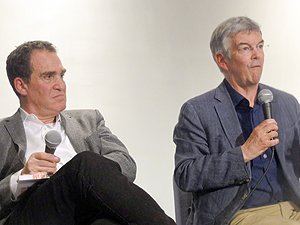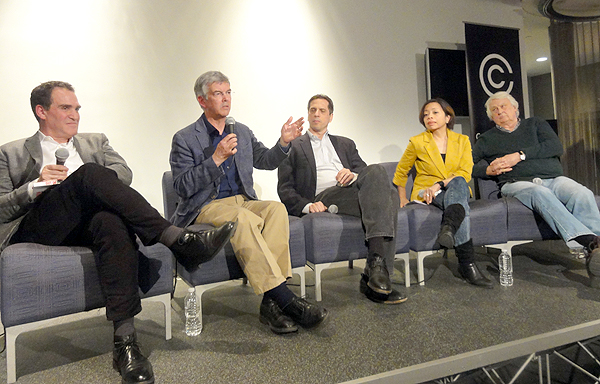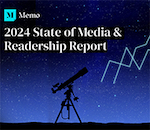The crisis dogging newsrooms across the globe has nothing to do with content; rather it flows from a reliance on a broken business model, according to veteran reporter George Brock.
 Photos: Sharlene Spingler |
Chaos in journalism is nothing new, said Brock, who noted that throughout history journalism has been in a state of continuous disruption beginning with the transition of the spoken word to stone tablet/parchment.
In his view, the only thing that was unusual was journalism’s extended period of relative calm before the current Internet storm hit.
The former Times of London reporter and author of “Out of Print” spoke March 26 at a Center for Communication panel called “Journalism: Bullish on the Future.” New York University’s department of media, culture and communication presented the session at the school’s Arthur L. Carter Journalism Institute.
Brock said “objective journalism” is a relatively new notion, as newspapers of the past were largely argumentative or driven by political interests.
He doesn’t expect print to disappear, but the medium is inherently unstable and not the place to be.
Many electronic-based experiments will arise, though most will fail. Ultimately the vacuum left by print will be filled, said optimist Brock.
J. Max Robins of Forbes moderated the event.
Field Day for Corruption
Panelist Steven Waldman said traditional media’s problem isn’t content, but the labor-intensive nature of accountability journalism.
Saying the advertiser-based business model is collapsed, Waldman described media’s quandary flowing from the decision of advertisers who used to bankroll print, failing to redirect that spending to digital versions of newspapers.
The money bypassed content creators, going to places like Facebook and Google, said Waldman.
His credentials include US News & World Report (national editor), Newsweek (national correspondent), Beliefnet (founder of religion site sold to Rupert Murdoch) and Federal Communications Commission (senior advisor to chairman).
 |
Brock and Waldman spoke of the pressures especially on local print media struggling to do “extractive reporting.”
They attempted to transition to online, but quickly discovered the local ad base just isn’t there to support that model.
The result is massive contraction, a staff downsizing that is bound to drive an upswing in local corruption.
As Waldman noted the reporter who used to cover local schools is now expected to also cover the health and courtroom beats.
U.K. native Brock said a favorite guessing game in Britain’s media world is to predict which national daily will forgo print entirely for the ‘Net.
His bet is on Financial Times with The Guardian as runner-up.
Panelists cited BuzzFeed and Jon Stewart as of the moment media success stories.
Though Stewart is celebrated for his ability “to pointing out hypocrisy,” his research team does real journalism.
Buzzfeed, which has been hiring reporters, will face a day of reckoning on whether it does serious journalism.
Waldman said that day will arrive when the site gives as much play to its “guy in Kabul” as it does to the latest cats’ video that costs three cents to produce and gets “zillions” of viewers.


 Trump Media & Technology Group today reported a $58.2M net loss on $4.1M in 2023 revenues, a disclosure that drove its stock price down 22.6 percent to $47.96.
Trump Media & Technology Group today reported a $58.2M net loss on $4.1M in 2023 revenues, a disclosure that drove its stock price down 22.6 percent to $47.96. Barry Pollack, an attorney at Wall Street’s Harris St. Laurent & Wechsler, has registered Julian Assange as a client with the Justice Dept. “out of an abundance of caution.”
Barry Pollack, an attorney at Wall Street’s Harris St. Laurent & Wechsler, has registered Julian Assange as a client with the Justice Dept. “out of an abundance of caution.” Paramount Global to slash 800 jobs in what chief executive Bob Bakish calls part of an effort to “return the company to earnings growth"... Rolling Stone editor-in-chief Noah Shachtman is exiting at the end of the month due to disagreements with chief executive Gus Wenner over the direction the magazine is taking... The New York Times broke the $1 billion barrier in annual revenue from digital subscriptions in 2023... Press Forward is investing more than $500 million to strengthen local newsrooms.
Paramount Global to slash 800 jobs in what chief executive Bob Bakish calls part of an effort to “return the company to earnings growth"... Rolling Stone editor-in-chief Noah Shachtman is exiting at the end of the month due to disagreements with chief executive Gus Wenner over the direction the magazine is taking... The New York Times broke the $1 billion barrier in annual revenue from digital subscriptions in 2023... Press Forward is investing more than $500 million to strengthen local newsrooms. The majority of news articles are read within the first three days of publication, according to a recent report.
The majority of news articles are read within the first three days of publication, according to a recent report. The Los Angeles Times gives pink slips to 115 people or 20 percent of its newsroom staff... TIME is also laying off about 30 employees, which is approximately 15 percent of its editorial staff... The Baltimore Banner, which was launched by Stewart Bainum in 2022 after he failed to buy the Baltimore Sun, added 500 subscribers per day in the three days following Sinclair Broadcast Group's deal to purchase the Sun.
The Los Angeles Times gives pink slips to 115 people or 20 percent of its newsroom staff... TIME is also laying off about 30 employees, which is approximately 15 percent of its editorial staff... The Baltimore Banner, which was launched by Stewart Bainum in 2022 after he failed to buy the Baltimore Sun, added 500 subscribers per day in the three days following Sinclair Broadcast Group's deal to purchase the Sun.


 Have a comment? Send it to
Have a comment? Send it to 
No comments have been submitted for this story yet.